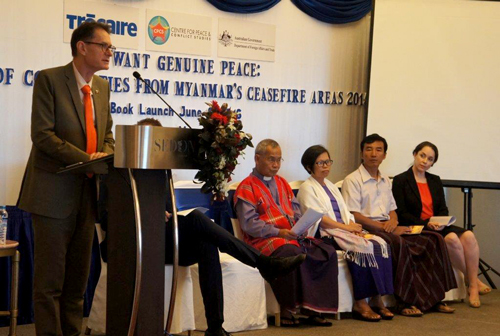Australia has been a prominent partner to Myanmar's peace process since 2013.
Australia's early assistance focused on building and sustaining confidence in the peace process, and providing real benefits to people in conflict-affected areas. The Centre for Peace and Conflict Studies (CPCS) is a key partner for Australia.
Earlier this year, with the support of Australian funds, CPCS released a new publication called 'We Want Genuine Peace – Voices of communities from Myanmar's ceasefire areas 2015'. The publication is based on research conducted in six conflict-affected areas in Myanmar: Kachin, Northern Shan, Southern Shan, Kayin, Kayah, and Mon. In close collaboration with local partner organisations, 'listeners' (those who live and are familiar with community contexts, cultures, and language) travelled to these areas to talk with community members and ask them about their perceptions and experiences of the peace process. 772 conversations took placed between November 2014 and March 2015 with 1,072 people.
The research highlights the positive impact bilateral ceasefires have had in these areas including in terms of the freedom of movement, reduced checkpoints, and decreased number of violent clashes. It also captures perceptions from the community on the importance of realising a sustainable peace process. Those living in non-conflict affected areas also support calls for lasting peace that will enable reconstruction of economic infrastructure to support Myanmar's future.
The research aims to inform decision-makers and other key stakeholders about the experiences and perspectives of communities in relation to the ongoing peace process, with a view to improving the inclusivity of the process.
More information
Credit: DFAT


